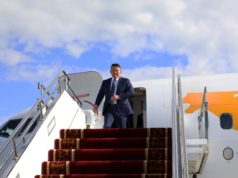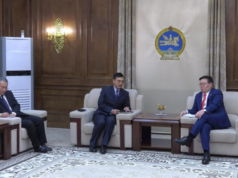
The UN estimates that up to one million Uyghurs are being held in reeducation camps in northwestern China. But even their children are affected, as revealed by a Thursday research published by the BBC. As documentation shows, China systematically separates children from their families, their beliefs, and their language.
Parallel to the efforts to force adult members of Muslim minorities to abandon their religion, culture and language and thus to educate „good“ Chinese citizens, their children should also be re-educated. According to the BBC, the children are housed in „boarding schools“ – far from their parents.
Often, they would not know where their children are and who cares about them, as there is often no contact at all. According to the BBC, 60 individual interviews conducted in Turkey with parents of missing children suggest that more than 100 children have disappeared – in the province of Xinjiang alone. Parents fear that they were taken to child-care centers. One mother told the BBC, „Thousands of innocent children are being separated from their parents. Why is the world silent when it knows these facts? “
Boarding school as an „ideal setting“ for re-education
Research by the German social scientist Adrian Zenz gives an insight into the extent of the re-education plans for the Uighur children: campuses were enlarged, new dormitories were built and capacities were increased enormously. In just one year, in 2017, the total number of children enrolled in kindergartens in Xinjiang increased by more than half a million. According to the government, Uyghur children and those of other Muslim minorities accounted for more than 90 percent of this increase.
In April last year, 2,000 children from the surrounding villages of the province were taken to another huge boarding school. Most of them, according to Zenz, are children of Uyghurs who are already interned in camps. Almost half of the 22 million inhabitants of Xinjiang are members of the minorities.
Schools secured with electric fences
The government says the school takes the place of parents and thus contributes to „maintaining social stability and peace“. The boarding schools, it is said, allowed minority children to learn „better living habits“ than at home. Zenz sees it differently: „Boarding schools provide the ideal framework for sustainable cultural reeducation of minority societies,“ he told the BBC.
According to BBC research, schools are as good as cut off from the outside world: many are equipped with nationwide surveillance systems and secured with 10,000 volt electric fences and alarm systems. The security spending of some schools would even surpass those of the camps, according to the report.
Tenth anniversary of the riots
„I believe the evidence of the systematic separation of parents and children is a clear indication that the Xinjiang government is trying to attract a new generation that is cut off from its original roots, religious beliefs, and language of its own,“ Zenz said who speaks of a „cultural genocide“ of the Muslim minority. This would be expressed in the fact that the culture, language and religion of the Uighurs in the camps would be eradicated.
Although Beijing is no longer arguing that the camps exist, torture allegations are rejected. The government instead speaks of „vocational training centers“, which served as a „modern means“ in the fight against terrorism. In fact, exactly ten years ago, bloody protests took place in Xinjiang province – these are still seen as the trigger for the systematic persecution of Muslims in the region.
Demand for the end of the persecution
Governments of other states, the United Nations Human Rights Council and China’s international partners should step up their efforts to stop the persecution of the Uyghur community, said Brad Adams, China director of the human rights organization Human Rights Watch.
„There must be clear answers as to what has happened to those who have disappeared in the huge and secreted detention system of the Chinese government since 2009.“ According to Adams, important trade relations and other political considerations should not make states treat China differently than countries who committed similar „tremendous abuses“.
Turkey plans delegation to identify the situation
As announced on Wednesday, Turkey wants to send a delegation to Xinjiang to investigate the situation of the Uyghurs there. Turkey has accepted an invitation from the Chinese government, according to Turkish communications director Fahrettin Altun.
President Recep Tayyip Erdogan has spoken out on the issue for a solution that „takes into account the concerns of both sides,“ said Altun. During his visit to Beijing on Tuesday, he said that he had communicated to his Chinese interlocutors „the views and expectations“ of Turkey and expressed the hope that the Uyghurs could live in „peace, health and prosperity“.



